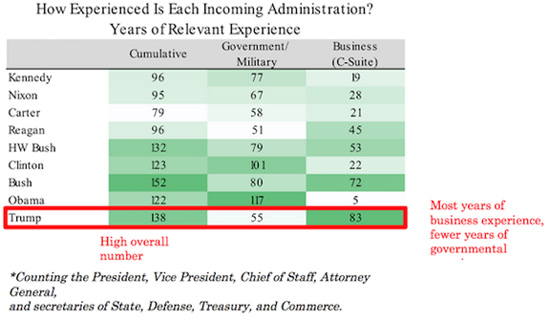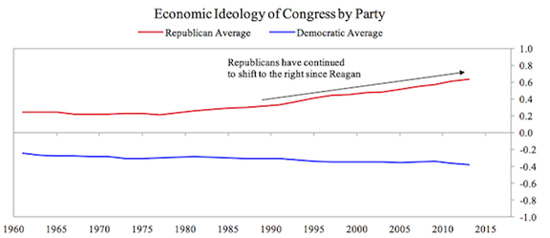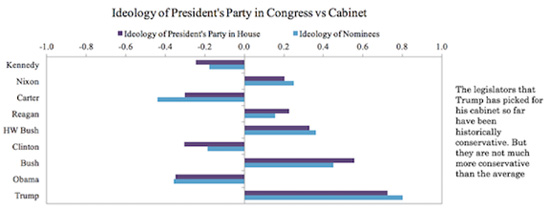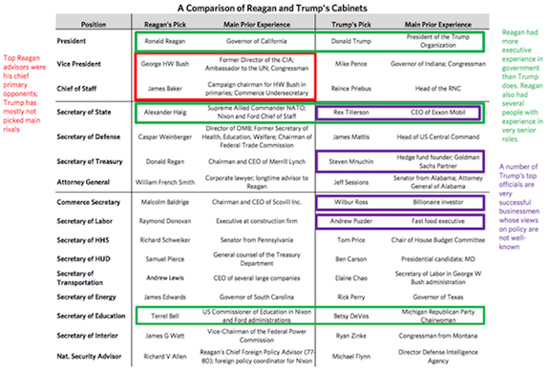Dalio
on Trump
John Mauldin
I
have never had the pleasure of meeting Ray Dalio, although I have talked with
many people who work with him, and I make it a point to read everything he
writes that I can get my hand on. (His outfit, Bridgewater Associates, is
notoriously guarded about letting their writings out. I know for a fact that
many folks at Bridgewater read my letter – which is admittedly free and
certainly doesn’t come with the gravitas of running $150 billion – but in the
spirit of the Christmas season I wonder if it wouldn’t be appropriate for them
to share a little bit of the wealth.)
That
being said, Dalio did post a piece a couple days ago on LinkedIn that scratches
the political itch that we all seem to have these days. It’s called
“Reflections on the Trump Presidency, One Month after the Election”; and given
the level of connections that Bridgewater management has and their often
outside-the-box views, as well as the fact that this piece from Ray is a
relatively positive one that seems appropriate before Christmas, I offer it up
as this week’s Outside the Box.
Dalio
makes the point “This will not just be a shift in government policy, but also a
shift in how government policy is pursued.” I am just back from a dinner
meeting with a number of people in Washington who have some insight into the
process, and I think I have to agree with that assessment.
The
interesting thing for us observers is going to be how a conservative House with
seriously competing ideas as to how tax policy should be done works together
with a Senate that has different views and with a Trump administration that has
yet again different approaches.
One
thing I focused on here at the dinner was that there seems to be a consensus
building in Congress to almost immediately repeal the Obamacare tax along with
several other taxes and have that as one of the first bills on Trump’s desk.
The reason for that move is that pretty much everyone agrees nothing will
happen quickly, and it isn’t clear which taxes will be cut; but they want to do
something to create stimulus as soon as possible, and then maybe even go back
and change everything all over again next summer. These cuts will be ones that
can be made quickly, and there were more than a few people in the room who are
familiar with the congressional process and who think a final tax bill may not
be out until later in the summer. And if you want some stimulus quickly,
cutting taxes is a simple way to get it. That doesn’t mean the taxes won’t all
get put back on in some form or another later on as they figure out what the
overall tax picture wil l look like; but for now it makes sense to get a quick
tax cut to everyone.
Frankly,
I hope they deal with the corporate tax quickly, as there seems to be some
bipartisan consensus on that. That would be better than trying to cobble
together one huge omnibus tax bill.
The
dinner was hosted by the Committee to Unleash Prosperity. In general, much of the
room was more optimistic about the potential for GDP growth in the coming years
than I am. And they were not as concerned about dealing with the growing total
debt of the US, although they did acknowledge that there is a very large
contingent of deficit hawks in the Congress and Senate who are going to have
their say on the budget and taxes.
Those
competing concerns – lowering taxes and dealing with the deficit and total debt
– leave me distinctly unsure about what will eventually come out of the sausage
factory that will create the new tax laws. But I don’t think there will be a
quick resolution of the issues. It is somewhat ironic that we did my final tax
planning today for 2016, but we really have no idea about planning for 2017
other than to assume that taxes want go down – and we hope that they do! I
would love to be pleasantly surprised by a quick resolution on taxes so that we
could all get on with business.
And
for those of you who simply can’t get enough politics these days (which
sometimes sadly includes even me – though hopefully I will recover soon), let
me suggest a quick read from my friend former Speaker of the House Newt
Gingrich. It’s a collection of his essays on this last election cycle, simply
called Electing Trump. You can get it for $3.99 on
Amazon, and it is available only on Kindle. It really is a quick read – you can
probably knock it out in less than 2 hours.
As
I’ve mentioned before, Newt has graciously engaged me in discussions on a wide
ranged of topics in the past year, and our conversations have of course drifted
to the political. He was consistently telling me since the fourth quarter of
2015 that Trump had a real chance. And he would patiently explain how
frustrated so much of America was. I saw the frustration, but my political
experience didn’t let me see how it would translate into a Trump victory. Now,
hindsight shows that Newt was 100% on target, and he actually kept a sort of
running diary of his comments and interviews, which is how this book could
appear so fast. As Newt often says to me, “Real change requires real change.” Halfway
measures are not going to make anybody happy. That’s where the rubber meets the
road, because what is a good change for some people can be very upsetting to
others. We will just have to see what emerges from the major process of chang e
we’re embarked upon.
Of
course Newt’s book is partisan. As my kids would say, duh. But the political
change he covers is part and parcel of a greater change that is happening.
We’re near the end of Neil Howe’s Fourth Turning. I am reading a book that is
probably going to be the subject of at least two letters early next year. It’s
called Men Without Work.
There are 10 million working-age men in America who are not participating in
the labor force, and that trend line has been moving inexorably from the lower
left to the upper right for 50 years, through Republican and Democratic
administrations, through recessions and boom times. It wasn’t slowed down by
the Clinton/Gingrich welfare reforms. The Greeks and the French have greater
labor force participation rates than we do. And when you couple this worrisome
trend with all of the other societal changes that are developing because of the
increasing use of technology in the business arena, those of us w ho are trying
to project macroeconomic outcomes are going to have to start paying much more
attention to what’s going on sociologically on the ground.
Is
Dalio right? Will we see a lift in animal spirits beyond the Trump rally that
morphs into actual businesses investing money in the creation of jobs? And will
those jobs positively impact Middle America?
The
economic world is no longer simply defined by supply and demand but is
increasingly under the sway of larger social and geopolitical movements. Trying
to get a handle on all this is most confusing for a simple analyst like me.
There
will be no letter from me this weekend, so let me wish you a Merry Christmas
and a Happy New Year and holidays. And I want to thank you for the best gift of
all, the gift of your attention and time. It is precious to me, and I continue
to try to be worthy of it. Now, let’s have a great week and enjoy family and
friends and a little good cheer.
Your
going into planning mode for 2017 analyst,
John Mauldin, Editor
Outside the Box
Reflections on the Trump Presidency, One Month after the Election
By Ray Dalio
Now that we’re a month past the election and most
of the cabinet posts have been filled, it is increasingly obvious that we are
about to experience a profound, president-led ideological shift that will have
a big impact on both the US and the world. This will not just be a shift
in government policy, but also a shift in how government policy is
pursued. Trump is a deal maker who negotiates hard, and doesn’t mind
getting banged around or banging others around. Similarly, the people he
chose are bold and hell-bent on playing hardball to make big changes happen in
economics and in foreign policy (as well as other areas such as education,
environmental policies, etc.). They also have different temperaments and
different views that will have to be resolved.
Regarding economics, if you haven’t read Ayn Rand
lately, I suggest that you do as her books pretty well capture the
mindset. This new administration hates weak, unproductive, socialist
people and policies, and it admires strong, can-do, profit makers. It
wants to, and probably will, shift the environment from one that makes profit
makers villains with limited power to one that makes them heroes with
significant power. The shift from the past administration to this
administration will probably be even more significant than the 1979-82 shift
from the socialists to the capitalists in the UK, US, and Germany when Margaret
Thatcher, Ronald Reagan, and Helmut Kohl came to power. To understand that
ideological shift you also might read Thatcher’s “The Downing Street Years.”
Or, you might reflect on China’s political/economic shift as marked by moving
from “protecting the iron rice bowl” to believing that “it’s glorious to be
rich.”
This particular shift by the Trump administration
could have a much bigger impact on the US economy than one would calculate on
the basis of changes in tax and spending policies alone because it could ignite
animal spirits and attract productive capital. Regarding igniting animal
spirits, if this administration can spark a virtuous cycle in which people can
make money, the move out of cash (that pays them virtually nothing) to risk-on
investments could be huge. Regarding attracting capital, Trump’s policies
can also have a big impact because businessmen and investors move very quickly
away from inhospitable environments to hospitable environments. Remember
how quickly money left and came back to places like Spain and Argentina? A
pro-business US with its rule of law, political stability, property rights
protections, and (soon to be) favorable corporate taxes offers a uniquely
attractive environment for those who make money and/or have money. These
policies will also have shocking negative impacts on certain sectors.
Regarding foreign policy, we should expect the
Trump administration to be comparably aggressive. Notably, even before
assuming the presidency, Trump is questioning the one-China policy which is a
shocking move. Policies pertaining to Iran, Mexico, and most other
countries will probably also be aggressive.
The question is whether this administration will
be a) aggressive and thoughtful or b) aggressive and reckless. The
interactions between Trump, his heavy-weight advisors, and them with each other
will likely determine the answer to this question. For example, on the
foreign policy front, what Trump, Flynn, Tillerson, and Mattis (and others) are
individually and collectively like will probably determine how much the new
administration’s policies will be a) aggressive and thoughtful versus b)
aggressive and reckless. We are pretty sure that it won’t take long to
find out.
In the next section we look at some of the new
appointees via some statistics to characterize what they’re like. Most
notably, many of the people entering the new administration have held serious
responsibilities that required pragmatism and sound judgment, with a notable
skew toward businessmen.
Perspective on the Ideology and Experience of the New Trump
Administration
We can get a rough sense of the experience of the
new Trump administration by adding up the years major appointees have spent in
relevant leadership positions. The table below compares the
executive/government experience of the Trump administration’s top eight
officials* to previous administrations, counting elected positions, government
roles with major administrative responsibilities, or time as C-suite corporate
executives or equivalent at mid-size or large companies. Trump’s
administration stands out for having by far the most business experience and a
bit lower than average government experience (lower compared to recent
presidents, and in line with Carter and Reagan). But the cumulative years
of executive/government experience of his appointees are second-highest. Obviously,
this is a very simple, imprecise measure, and there will be gray zones in
exactly how you classify people, but it is indicative.

Below we show some rough quantitative measures of
the ideological shift to the right we’re likely to see under Trump and the
Republican Congress. First, we look at the economic ideology of the
incoming US Congress. Trump’s views may differ in some important ways from
the Congressional Republicans, but he’ll need Congressional support for many of
his policies and he’s picking many of his nominees from the heart of the
Republican Party. As the chart below shows, the Republican members of
Congress have shifted significantly to the right on economic issues since
Reagan; Democratic congressmen have shifted a bit to the left. The measure
below is one-dimensional and not precise, but it captures the flavor of the
shift. The measure was commissioned by a National Science Foundation grant
and is meant to capture economic views with a focus on government intervention
on the economy. They looked at each congressman’s vo ting record, compared
it to a measure of what an archetypical liberal or conservative congressman
would have done, and rated each member of Congress on a scale of -1 to 1 (with
-1 corresponding to an archetypical liberal and +1 corresponding to an
archetypical conservative).

When we look more specifically at the ideology of
Trump’s cabinet nominees, we see the same shift to the right on economic
issues. Below we compare the ideology of Trump’s cabinet nominees to those
of prior administrations using the same methodology as described above for the
cabinet members who have been in the legislature. By this measure, Trump’s
administration is the most conservative in recent American history, but only
slightly more conservative than the average Republican congressman. Keep
in mind that we are only including members of the new administration who have
voting records (which is a very small group of people so far).

While the Trump administration appears very
right-leaning by the measures above, it’s worth keeping in mind that Trump’s
stated ideology differs from traditional Republicans in a number of ways, most
notably on issues related to free trade and protectionism. In addition, a
number of key members of his team—such as Steven Mnuchin, Rex Tillerson, and
Wilbur Ross—don’t have voting records and may not subscribe to the same brand
of conservatism as many Republican congressmen. There’s a degree of
difference in ideology and a level of uncertainty that these measures don’t
convey.
Comparing the Trump and Reagan Administrations
The above was a very rough quantitative look at
Trump’s administration. To draw out some more nuances, below we zoom in on
Trump’s particular appointees and compare them to those of the Reagan
administration. Trump is still filling in his appointments, so the picture
is still emerging and our observations are based on his key appointments so
far.
Looking closer, a few observations are worth
noting. First, the overall quality of government experience in the Trump
administration looks to be a bit less than Reagan’s, while the Trump team’s
strong business experience stands out (in particular, the amount of business
experience among top cabinet nominees). Even though Reagan’s
administration had somewhat fewer years of government experience, the typical
quality of that experience was somewhat higher, with more people who had served
in senior government positions. Reagan himself had more political
experience than Trump does, having served as the governor of California for
eight years prior to taking office, and he also had people with significant
past government experience in top posts (such as his VP, George HW
Bush). By contrast, Trump’s appointees bring lots of high quality business
leadership experience from roles that required pragmatism and
judgment. Rex Tillerson’s time as head of a global oil company is a good
example of high-level international business experience with clear relevance to
his role as Secretary of State (to some extent reminiscent of Reagan’s second
Secretary of State, George Shultz, who had a mix of past government experience
and international business experience as the president of the construction firm
Bechtel). Steven Mnuchin and Wilbur Ross have serious business credentials
as well, not to mention Trump’s own experience. It’s also of note that
Trump has leaned heavily on appointees with military experience to compensate
for his lack of foreign policy experience (appointing three generals for
Defense, National Security Advisor, and Homeland Security), while Reagan
compensated for his weakness in that area with appointees from both military
and civilian government backgrounds (Bush had been CIA head and UN ambassador,
and Reagan’s first Secretary of State, Alexander Haig, was Supreme Allied
Commander of NATO forces during the Cold War). Also, Trump has seemed less
willing to make appointments from among his opponents than Reagan was (Reagan’s
Chief of Staff had chaired opposing campaigns, and his Vice President had run
against him).

By and large, deal-maker businessmen will be
running the government. Their boldness will almost certainly make the next
four years incredibly interesting and will keep us all on our toes.
0 comments:
Publicar un comentario